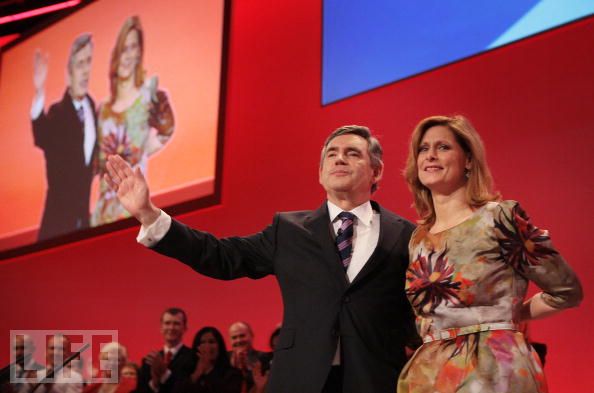
Napoleon said he would have given three regiments for a newspaper. What would he have given for a whole raft of newspapers, television channels and radio stations? The 2010 general election has been a media event, a political process laughingly called democracy, in which the people are turned into spectators; an audience. The intention is to politically disarm the people, specifically the working class, by the form in which the election is conducted.
In 1979 the Revolutionary Communist Group, with its publication Hands off Ireland, intervened in the election with our call for a boycott and Vote H instead of X, in support of the Irish republican prisoners held in the H-Blocks. We were able to argue the case for British withdrawal from Ireland and against the Labour government that was directing the war against the Irish people and could have discussions outside meetings with the then Prime Minister James Callaghan and tell him what we thought about Labour’s imperialist policy in Ireland.
In 1983 the RCG and Fight Racism! Fight Imperialism! argued ‘no vote for imperialists’. We observed that, ‘Our intervention proved that there was little interest in this election in working class areas where we leafleted and held street meetings. Election meetings were very infrequent and were mainly attended by middle class people and better-off workers. These reacted with fury to the anti-imperialist position we tried to put from the floor of these meetings. Racism and Ireland, we were told, were irrelevant. Democratic discussion and debate was non-existent as Labour stewards attacked and assaulted anyone who attempted to question leading politicians.’ (FRFI 30, June/July 1983). By 1987, ‘The main Labour election meetings were pre-packaged, stage managed media events. Anyone daring to disturb the smooth running of these events by, for example, trying to question the speakers, was unceremoniously thrown out, abused and, often, assaulted. In Bolton, a black RCG member was called a ‘black bastard’, physically manhandled and locked in a room for the duration of the meeting because he raised the issue of racism at a Kinnock rally.’ (FRFI 69, June/July 1987).
In 1992 we said that, ‘Today the working class is systematically excluded from participating in the election. In 1950, 40% of voters remembered going to a meeting during the election period and more than 50% were canvassed. In 1987 only 3% went to a meeting and only 20% were canvassed. Today there are hardly any public meetings, except for invited audiences of party faithful, and virtually no canvassing. The election is merely a media event in which the major parties compete for the better-off working class and middle class vote. For the mass of the working class parliamentary democracy is a sham. That is why we will not vote.’ (FRFI, election special issue, April 1992).
Reflecting on his experiences of political meetings during the 1992 campaign, Hugo Young wrote an article Politics without people, ‘Our process has become, as never before, quarantined. Communications are swifter and more spacious than ever but they move in one direction, from top to bottom. From the people there is an organised silence…the Labour Party could not direct me to a single public meeting being addressed by a shadow cabinet member in London this week or next.’ (The Guardian, 25 March 1997).
Politicians appear before specially designed sets with specially selected audiences. The inspiration for the set and the performance are taken from the entertainment industry. The process is tailored to the technology; the lighting and the cameras. Shades are chosen to match the lights; the whole effect resembles the Harrods’ cosmetic department where even the most flawed skin is turned to peaches and cream. Marketing men and communication directors are hired to invent and rehearse the ‘one-liners’, ‘sound bites’ – anything that can fit on a T-shirt. The politics must be entertaining, upbeat, optimistic and not too serious or uncertain. What kind of democracy is it when political posters, advertising hoardings, are unveiled as if they were works of art? The world of the ‘spin-doctor’, the ‘image consultant’ and the make-up man – as Lenin put it, ‘In the era of printing and parliamentarism it is impossible to gain the following of the masses without a widely ramified, systematically managed, well equipped system of flattery, lies, fraud, juggling with fashionable and popular catchwords and promising all manner of reforms and blessings to workers right and left – as long as they renounce the struggle for the revolutionary overthrow of the bourgeoisie.’
Baudelaire observed of Louis Napoleon (of whom Marx wrote The Eighteenth Brumaire), ‘The supreme glory of Napoleon III will have been to prove that anybody can govern a great nation as soon as they have got control of the telegraph and national press.’ There could be no more suitable comment on the Clegg phenomenon.
When Gordon Brown made the mistake of going for a ‘walkabout’ in Rochdaleon 28 April he met Gillian Duffy, who had been insufficiently rehearsed. ‘That was a disaster,’ Brown said in his car. Life, spontaneity and authentic communication with people are replaced by artifice, theatre and scripts. Stray from the script, catch the wrong light and it’s a ‘disaster’. Narcissus, we are told, fell in love with his own image, but took it to be the image of someone else. So lost to reality was he that the one he talked about and dwelt upon so attentively was none other than himself. So enthralled by their media image are they that the politicians lose sight of the fact that increasingly we are not watching and we are not going to vote. The dispossession of the working class by this media charade cannot continue. Politics will not be confined to the studio, it must go back to the streets – our voice will be heard and we will not be quarantined
Trevor Rayne




